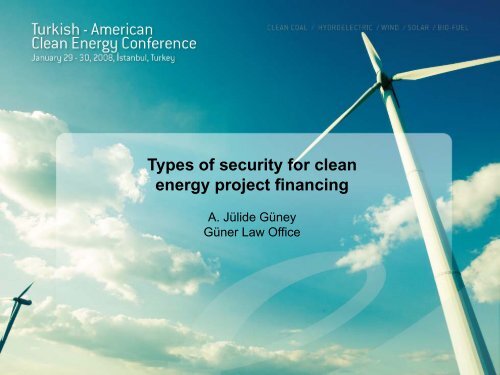2. Types of security for clean energy project financing
2. Types of security for clean energy project financing
2. Types of security for clean energy project financing
Create successful ePaper yourself
Turn your PDF publications into a flip-book with our unique Google optimized e-Paper software.
Part 1Introduction
What is <strong>project</strong> finance?The <strong>financing</strong> <strong>of</strong> the development or exploitation <strong>of</strong> a right,natural resource or other asset, where the bulk <strong>of</strong> the<strong>financing</strong> is to be provided by way <strong>of</strong> debt and is to be repaidprincipally out <strong>of</strong> the assets being financed.Key elements1) Debt finances specific <strong>project</strong>2) Lenders look (primarily) to <strong>project</strong>cash flows <strong>for</strong> repayment3) Recourse to sponsors is limited4) Debt is secured on <strong>project</strong>’s assets
Contractual matrixSponsor 1Sponsor 2 Sponsor 3InsurersInsurance contractsShareholders’ agreementJV agreementBanks /other fundersGovernmentConcessionagreement / licenceEquity investmentProjectCompanyLoan agreements and<strong>security</strong> contractsSuppliersSupply agreementsOfftake agreementsOfftakersDesign andconstruction contractOperation andmaintenance agreementsContractor’s (sponsor(s))Operator (sponsor(s))Sub-contractorsSub-contractors
Legal documentationLending documentsLoan agreements with:banks / export credit agencies / multilateralsShareholder /sponsor documentsPre-development agreementsshareholders’ agreementsponsor support agreementProjectCompanySecurity documentsSecurity documents coveringall <strong>project</strong> assetsProject documentsConstruction agreement; operation and maintenance agreement;fuel supply agreement; sales / <strong>of</strong>ftake agreement
Motives <strong>for</strong> taking <strong>security</strong>• Contrast with other asset finance e.g. ships, aircraft, property• More difficult with <strong>project</strong>s because• assets have little value• real <strong>security</strong> is cash flow• contractual rights are key• many key <strong>project</strong> parties• Motives <strong>for</strong> taking <strong>security</strong> different• defensive• control
Initial questions• Is the <strong>project</strong> company a SPV?• Collective <strong>security</strong> recognised?• Level <strong>of</strong> registration charges
Part 2<strong>Types</strong> <strong>of</strong> <strong>security</strong>
Step-in rights• Art.5 <strong>of</strong> the Electricity Licensing Regulation (“ELR”)stipulates licenses can not be transferred• If limited or non-recourse <strong>project</strong> finance is provided to thelicensee then• by sending a reasoned notification to EMRA, lenders can suggest that itgrant a license to a third party• suggested third party must assume all liabilities <strong>of</strong> current licensee
Step-in rights (cont’d)• Art.15 ELR: licensee can transfer generation facilities bysale, transfer or any other arrangement• EMRA approval required• Transferee must be licensed be<strong>for</strong>e the transfer• License <strong>of</strong> new licensee only effective after• completion <strong>of</strong> the transfer <strong>of</strong> generation facilities• cancellation <strong>of</strong> previous license
Pledge <strong>of</strong> shares• Registered shares – written agreement and endorsement <strong>of</strong>shares• Bearer shares – delivery to pledgee or his custodian• Advisable to register the pledge in the borrower company’sshare register (puts third parties on notice <strong>of</strong> share pledge)• Covers financial rights but not voting rights unless specificallyagreed in pledge agreement• Art.47 ELR: Any pledge or acquisition <strong>of</strong> a right to voterepresenting more than 10% (5% <strong>for</strong> publicly held companies)<strong>of</strong> a licensee’s shares is subject to EMRA approval
Assignment <strong>of</strong> receivables• Security over all receivables under <strong>project</strong> companyagreements preferred• Single assignment <strong>of</strong> receivables agreement• Consent <strong>of</strong> counterparty not required but prudent to notifyand obtain written acknowledgment• Future receivables assignable if identified or identifiable
Assignment <strong>of</strong> receivables (cont’d)• Ancillary rights (e.g. <strong>security</strong> rights) automaticallytransferred but advisable to amend relevant registers• Can also assign receivables under agreements between<strong>project</strong> company and retail sellers (agreements stipulatingpurchase and price guarantee pursuant to Law No 5346concerning the use <strong>of</strong> renewable <strong>energy</strong> sources <strong>for</strong> thegeneration <strong>of</strong> electrical <strong>energy</strong>)• EMRA approval required <strong>for</strong> assignment <strong>of</strong> licensee’srights under para.3 <strong>of</strong> Art.5 <strong>of</strong> ELR
Commercial enterprise pledge (“CEP”)• Commercial Enterprise Law No 1447• Created only in favour <strong>of</strong> financial institutions• Whole enterprise not individual assets• Scope• trade and business names• all machinery, tools, equipment and vehicles• IP inc. trademarks, patents, licenses, etc.• contractual rights, raw materials and immovables are not covered
Commercial enterprise pledge (cont’d)• CEP agreement certified by Notary Public• Registration at Trade Registry within 10 days <strong>of</strong> execution• Registration <strong>of</strong> IP at Turkish Patent Institute• EMRA approval required?• In practice EMRA reviews and comments on CEPagreements
Pledge <strong>of</strong> on-shore account• Must be a written agreement• Consent <strong>of</strong> account holding bank not required but advisedespecially if any obligations (e.g. restricting withdrawals onpaying funds direct to pledgee) are to be assumed by it• EMRA approval required?• Un<strong>of</strong>ficial view <strong>of</strong> EMRA <strong>of</strong>ficials that approval not required
Mortgage over immovable assets• Official deed prepared by local title registry <strong>of</strong>fice• Recorded on title records• Covers integral parts and fixtures• Constant degree principle• Capital amount vs. upper limit mortgages• EMRA approval required?• Art. 15 ELR implies that approval is only required <strong>for</strong>assets classified as “generation facilities”
<strong>Types</strong> <strong>of</strong> <strong>security</strong> <strong>for</strong> <strong>clean</strong> <strong>energy</strong><strong>project</strong> <strong>financing</strong>Julide GüneyGüner Law Office – 30 January 2008
















